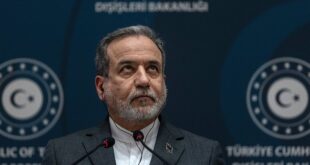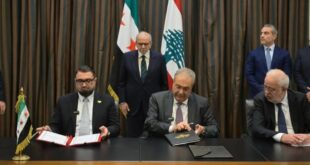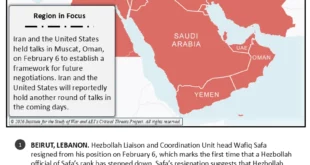 Released BBC correspondent Alan Johnston, kidnapped March 12 in Gaza by a group calling itself the Army of Islam, described his nearly four months in captivity as being “buried alive.”
Released BBC correspondent Alan Johnston, kidnapped March 12 in Gaza by a group calling itself the Army of Islam, described his nearly four months in captivity as being “buried alive.”
“The last 16 weeks have been the very worst of my life,” he said at a press conference a few hours after being freed.
“It was like being buried alive, being removed from the world [with] occasionally very terrifying people who were dangerous and unpredictable and frightening.”
“The stresses are absolutely huge,” he said.
“It’s a battle to keep your mind in the right place.”
He said he felt “unimaginable relief” upon his release.
“I’ve dreamt, literally dreamt, many times of being free again and I would always wake up in that room.”
It was hard for him to believe, Johnston said, that he will not wake up back in captivity again.
He said his captors were not violent, although they were often “rude and unfriendly” and sometimes threatened his life.
He said he was chained briefly and became sick twice. BBC sources told CNN they likely would wait to begin shepherding Johnston out of Gaza.
At about dawn in Gaza (9:30 p.m. ET), Johnston, wearing blue jeans and a button-down shirt and looking gaunt, was led out of a building and hustled into the back of a sport-utility vehicle driven by Hamas members.
Johnston called CNN’s senior correspondent in Jerusalem Ben Wedemen shortly after being released.
“I am so glad to be free. It’s great to be able to talk to people like you,” Johnston said.
He described his ordeal as “a nightmare … I didn’t think it would ever end.”
At the news conference, he embraced former Palestinian Authority Prime Minister and Hamas member Ismail Haniya.
Johnston credited Palestinians across the “political spectrum,” and specifically Hamas with putting pressure on his kidnappers to release him.
He said he was allowed to have a radio during his time as a hostage and listened to the BBC world service.
He said the messages and stories of support from around the world that he heard on the radio kept his spirits up and his hopes alive.
On June 26, Johnston appeared in a Web video apparently posted by the Army of Islam.
He appeared to be wearing an explosives vest.
At that time, his abductors warned they would kill Johnston if their demands were not met or if a rescue was attempted.
The Army of Islam blamed Hamas militants for kidnapping two of its members the week of June 26 while they were leaving a Gaza mosque after morning prayers.
A Hamas spokesman confirmed at that time that its forces arrested two individuals with links to Army of Islam in Gaza.
In the statement, Army of Islam appears to link the detention of its members with the renewed threat to Johnston’s life, calling the detention a declaration of war.
In the video, Johnston said, “I do appeal to the Hamas movement and the British government not — not — to resort to the tactics of force in an effort to end this.”
He warned that his captors would turn their hideout into a “death zone” if any rescue attempt were made.
Then the Army of Islam restated its demand that Britain free radical Muslim cleric Abu Qatada, a Jordanian-born Palestinian who faces deportation to his home country.
Abu Qatada, who is known as Osama bin Laden’s spiritual ambassador in Europe, is being held in Britain for suspected links with terrorist organizations.
British ministers have described him as an “inspiration” for terrorists such as Mohamed Atta, the lead hijacker behind the September 11, 2001, terror attacks.
The group also demanded Jordan free Sajida al-Rishawi, an Iraqi woman jailed for her involvement in the November 2005 wedding party suicide bombing, one of three nearly simultaneous hotel bombings in Amman that killed 60 people.
In a televised confession shortly after the bombing, al-Rishawi — the widow of one of the suicide bombers — said her explosives failed to go off.
Most of those who died in the attacks were Jordanians attending the wedding party.
The Army of Islam also called for the release of Abu Mohamad al-Maqdasi, whose identity is unclear.
Days after they seized control of Gaza, Hamas officials said Johnston’s release was imminent, but that was later disputed by an Army of Islam spokesman.
Hamas spokesman Ghazi Hamad told CNN that Hamas was directly involved in negotiating Johnston’s release.
“We have private channel with these people,” Hamad said Monday.
Johnston, 45, joined the BBC in 1991. He said in a video released in early June he was being treated well and was in good health.
Little is known about the Army of Islam, which also claimed to have taken part in the 2006 kidnapping of Israeli army Cpl. Gilad Shalit.
Hamas released an audio message Monday on the anniversary of Shalit’s kidnapping, purportedly from the 20-year-old soldier, pleading with Israel to bring about his release.
Hamas called the message a “signal” to Israel that Hamas wants to resume negotiations for the release of Palestinian prisoners in exchange for Shalit.
Johnston is one of 15 journalists abducted in Gaza since 2004, according to the New York-based Committee to Protect Journalists. All the others were released unharmed, usually within days of their abductions.
According to CPJ, the kidnappings appear to be the work of “private individuals or groups seeking to exploit foreign hostages for political purposes or to use them as bargaining chips to secure the release of jailed relatives or to win government jobs.”
“To CPJ’s knowledge, none of those responsible for abducting members of the media have ever been apprehended or brought to justice for their actions,” the committee said.
The following are recent kidnappings of journalists in Gaza:
Jaime Razuri, a photographer working for Agence France-Presse, was kidnapped January 1 and released a week later.
 Eurasia Press & News
Eurasia Press & News


